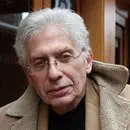
We don’t have to wonder what J.D Salinger would have thought of the world today even as Israel fights back mobs from Syria and prepares for more bloodlust from its enemies domestic and abroad. Salinger told it plainly and powerfully in his novel “The Catcher in the Rye,” published in 1951, and following that, in his 60 years of retreat into silence. He would have called his vow of silence, “The fire between the words.”
“The Catcher in the Rye,” one of the most admired novels of the century past and present, is a work of loathing and lamentation despite its teenage lingo.
Holden Caulfield seeks truth and purity but finds mendacity and corruption. Justice, justice, he pursues. Do I suggest that Salinger was Biblical? Well, he certainly felt Jewish. He was born to a Jewish father and not till later, after his Bar Mitzvah, did he find out that his mother was Catholic, passing for Jewish. (We will save the technicalities for later, they are irrelevant to this article)
In his humility he never prided his Jewishness, nor did he ever shame it, like Philip Roth.
Along the way to his fame as one of our greatest writers, something happened to Salinger that demands our attention at this very moment as we brace for Israel’s summer of discontent, which has already started at all sides from a world that, once again, won’t calm down until it gets what it wants…
Salinger is our witness to what happened before and to what can happen again.
His influences may have been Twain and Hemingway, but his heritage, his roots as a Jew and as a writer, reached back to King David whose every Psalm is fire within the words and fire between the words. Salinger sought a life of total prayer. Perhaps without knowing it (but marked in his DNA) he embraced King David’s And I am prayer…“v’ani tefilla.” (Psalm 109)
Salinger pursued a life of meditation and went in and out of Zen/Hinduism but he never forgot his people, Israel. As Moses was brought back to his Jewish senses in Egypt’s camps of slavery, Salinger, an indulged Manhattan rich kid, was awakened in Dachau’s camps of death. As part of the 12th Infantry Regiment, 4th Infantry Division, Salinger was heroic at Utah Beach/D-Day and later at The Battle of the Bulge. After such combat fury, he thought he saw everything.
He was not prepared for Dachau.
What he saw there, as a counterintelligence officer, we cannot imagine. Neither could he. (Kenneth Slawenski’s biography of Salinger – highly recommended.)
He told his daughter, “You never get the smell of burning flesh out of your nose entirely. No matter how long you live.” (He died at age 91, Jan.27, 2010.)
Salinger began writing “The Catcher in the Rye” before the war and completed the work upon his return. Why is there so much bitterness in this book – this book that picks up where Kafka left off in its dismay at a world long on insanity and short on pity? The origin of this indignation has to be, in a word, Dachau. He never recovered from this and was even hospitalized for symptoms of traumatic stress disorder.
Isaac returned silent from the Akeda and Salinger returned silent from Dachau.
Subtle as he was, only once did Salinger openly write about anti-Semitism. In “Down at the Dinghy,” a boy hides frightened because someone called his father “Kike.”
Through their flotillas, their nakbas, their naksas, plus the leftist traitors within our own camps, the world has once again linked arms to lead us to another Dachau. “Why are the nations in an uproar [against Israel],” wrote David. Salinger had no direct answer, but he saw firsthand the results of “baseless hatred” and he never forgot and he never forgave.
So he went speechless, leaving it for us to speak up and tell the world that if it still wants our burning flesh… Dachau for you…Israel for us.
